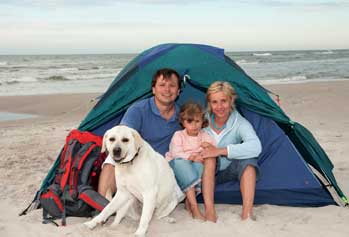|
|
|||
| Disaster Preparedness for Pets
Plan ahead and keep both your pets and family safe in case of an emergency or disaster |
|
||
|
FREE! Natural Weight Loss
Program recommended by The Share Guide
|
The key to survival during a disaster, crisis or emergency is to be as prepared as possible beforehand. Take the time to make a disaster plan and assemble an emergency kit for you and your pet. By taking these steps now, you will greatly increase your pet's chances of survival in the event of a disaster. The Humane Society of the United States recommends the following actions to make sure your pets are taken care of when disaster or emergency strikes: 1) Find a trusted neighbor and give them a key to your house or barn. Make sure this person is comfortable and familiar with your pets. Make sure the neighbor knows your pets' whereabouts and habits, so they will not have to waste precious time trying to find or catch them. 2) Create a pet emergency/disaster kit and place it in a prominent place where your neighbor can find it. 3) If the emergency involves evacuation make sure the neighbor would be willing to take your pets and has access to the appropriate carriers and leashes. Plan to meet at a prearranged location. (If you use a pet sitting service, they may be available to help, but discuss the possibility well in advance.) 4) Make a Disaster Supply Checklist. Every member of your family should know what he or she needs to take when you evacuate. You also need to prepare supplies for your pet. Stock up on non-perishables well ahead of time, and have everything ready to go in the event of a disaster at a moment's notice. Keep everything accessible, stored in sturdy containers (duffel bags, covered trash containers, etc.) that can be carried easily. If you reside in an area prone to certain seasonal disasters, such as flooding or hurricanes that might require evacuation, create a kit to keep in your car. In your pet disaster kit, you should include:
The single most important thing you can do to protect your pets is to take them with you when you evacuate. Animals left behind in a disaster can easily be injured, lost, or killed. Animals left inside your home can escape through storm-damaged areas, such as broken windows. Animals turned loose to fend for themselves are likely to become victims of exposure, starvation, predators, contaminated food or water, or accidents. Leave early; don't wait for a mandatory evacuation order. An unnecessary trip is far better than waiting too long to leave safely with your pets. Find a Safe Place Ahead of Time Because evacuation shelters generally don't accept pets (except for service animals), you must plan ahead to make certain your family and pets will have a safe place to stay. Don't wait until disaster strikes to do your research. Contact hotels and motels outside your immediate area to check policies on accepting pets. Check with friends, relatives or others outside your immediate area and ask if they would be able to shelter you and your animals or just your animals, if necessary. Make a list of boarding facilities and veterinary offices that might be able to shelter animals in disaster emergencies; include 24-hour telephone numbers. Ask your local animal shelter if it provides foster care or shelter for pets in an emergency. (This should be your last resort, as shelters have limited resources and are likely to be stretched to their limits during an emergency.) Don't Forget ID Your pet should be wearing up-to-date identification at all times. This includes adding your current cell phone number to your pet's tag. It may also be a good idea to include the phone number of a friend or relative outside your immediate area-if your pet is lost, you'll want to provide a number on the tag that will be answered even if you're away. If You're Not Home During a Disaster In the advent of a disaster, make arrangements well in advance for a trusted neighbor or friend to take your pets and meet you at a specified location. Be sure the person is comfortable with your pets and your pets are familiar with him/her, knows where your animals are likely to be, knows where your disaster supplies are kept, and has a key to your home. Sheltering in Place If your family and pets must wait out a storm or other disaster at home, identify a safe area of your home where you can all stay together. Be sure to close your windows and doors, stay inside, and follow the instructions from your local emergency management office. Bring your pets indoors as soon as local authorities say there is an imminent problem. Keep pets under your direct control; if you have to evacuate, you will not have to spend time trying to find them. Keep dogs on leashes and cats in carriers, and make sure they are wearing identification. If you have a room you can designate as a "safe room," put your emergency supplies in that room in advance, including your pet's crate and supplies. Listen to the radio periodically, and don't come out until you know it's safe. Reprinted from www.humanesociety.org Related Info: The Unconditional Love of Pets Pet Vaccines: Are They All Necessary? The Pet Vaccine Debate: Changing the Status Quo Keep Your Pet Safe from Poisons in the Home Pet Adoption: The Loving Option The Rescue Ranch at Animal Place Dr. Randy Wysong on Pet Nutrition Natural Weight Loss Program recommended by The Share Guide: learn more MORE
HEALTH ARTICLES  Follow us on Facebook Follow us on FacebookHome Shop |
||
|
|
|||
|
|
|
||

